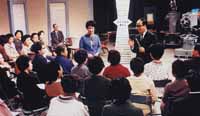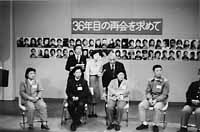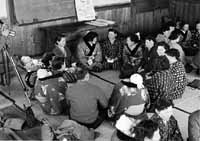|
TV back-fence gossip
In the 1960's, Japan was in the midst of
an era of rapid economic growth. The spread of home electrical appliances
was saving housewives some of the toil of housework, giving them more
time to watch TV. The time was ripe for a new type of program: Hello
Homemakers, a live magazine show (called "wide show"
in Japanese), was launched in 1966. Every morning 20 housewives assembled
in a studio to share opinions and experiences about such issues as conflict
with mothers-in-law, the communication gap between children and parents,
how to tie kimono sashes and how to manage family finances. This chatty
style earned the show the nickname, "TV Back-Fence Gossip."
Host Suzuki Kenji's skilled moderation brought out the participants'
true feelings, and pioneered the idea of audience participation.
War not over for many
In the 70's and 80's, the name was changed
to All Together and then Morning
Plaza. In 1981, 36 years after the war ended, a movement began
to repatriate Japanese war orphans left behind in China amid the chaos
towards the end of the Second World War. Morning
Plaza broadcast an appeal for clues to the orphans' relatives,
and the show became a parade of tearful reunions. The program took up
the subject of the war through an eye-witness series. Broadcast every
summer, these programs revealed that, for many people, the scars of
war had still not fully healed.
Shows you can rely on
In 1984, Morning
Journal went on the air, bringing with it a more vivid portrayal
of social issues. Shows on bullying, corporal punishment, spouses being
posted to jobs far away from their families, and unethical business
practices took viewers beyond the living room to explore the nation's
social problems. This new approach struck a chord with many people.
From 1995 to the present the banner has
been carried by Have A Good Day!,
which has addressed the question of how to live a healthy and genuinely
fulfilling life. Broadcast from a warmly welcoming studio, and chock
full of practical hints, the show has become a dependable source of
information.
|
|
Era of high economic growth
From 1976, Educational TV carried an economics
show targeting businesspeople called White-collar
Life. Then, in 1988, NHK Economics
Magazine began on General TV. For the first time on a business
show, the Program Production Department and News Department formed a
project team in order to cover fresh, exclusive stories without being
bound to a preset schedule. This enabled the show to report flexibly
on emerging developments in Japan and internationally.
After the bursting of the bubble economy,
viewers needed information about business and the economy more than
ever. Following in the footsteps of NHK Economics
Magazine, NHK created programs like Sunday
Business Scope, Understanding Economics
and 21st Century Business Forum. Satellite
broadcasting has also played an important role in business shows, from
Japan Business Today and NHK
Business Line to today's BS23 Economics
Frontline.
Project X: Challengers,
which began in 2000, puts the spotlight on the unheralded people behind
Japan's rapid post-war economic growth. This program has been extremely
popular right from the start.
Changes in rural life
From the first broadcast in 1958 to the
last in 1985, Farming Today and its
forerunner racked up 8,300 episodes. When the program was launched in
the 50's, it chronicled farmers' struggle to extract larger harvests
from the land. In the 60's, rapid economic growth drew many workers
from farms into the cities. The 70's saw the start of a new policy of
mandatory reductions in rice cultivation. For 27 years, Farming
Today chronicled the transformation wrought on agriculture and
farming communities by the industrialization of Japan.
Farming Today
and Fishing Today linked up
urban consumers with rural producers to foster a deeper understanding.
As issues like food safety, direct producer-consumer relations, and
the improvement of Japan's food self-sufficiency became more prominent,
these programs aimed to provide useful information to consumers. This
approach has been carried on by their successors Early
Rise Japan and now The New Century
of Food, which addresses food production in the 21st century.
|




